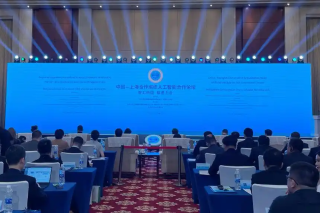Nankai University scholar publishes long-lost Latin translation of Tao Te Ching

Misha Tadd (third from right), a Nankai University scholar, discovered and published the Latin translation of the Tao Te Ching. [Photo by Yan Dongjie/chinadaily.com.cn]
A Latin translation of the Tao Te Ching, forgotten in the British Library for more than 300 years, has been rediscovered and published through the efforts of Misha Tadd, a scholar at Nankai University in Tianjin.
The rare manuscript offers insight into how the Chinese philosophical classic first reached the West and sheds light on early cross-cultural interpretations of Laozi's teachings. It was translated by missionaries in the early 18th century.
Tadd's connection with the Tao Te Ching began at the age of 14, when he came across an English version in a small-town library in the United States. That chance encounter sparked a lifelong interest that eventually led him to the British Library, where he began searching for a long-lost Latin translation.
He discovered that parts of the manuscript were faded and incomplete, and it was not until 2022 that he managed to obtain a full digital scan of the work. He spent a long time transcribing, comparing, and annotating the text word by word. "It was during the process of searching for translations of the Tao Te Ching that I conceived the academic concept of Global Laozegetics," Tadd said.
According to Tadd, the manuscript represents the earliest phase of the Tao Te Ching's globalization. He sees it as a bridge between Traditional Laozegetics, rooted in Chinese scholarly commentary, and Global Laozegetics, which reflects a fusion of Chinese and Western thought.
Chen Guying, a Taoism scholar and professor at Peking University, said that this translation expands the academic understanding of the translation history of the Tao Te Ching and holds significant academic value for the international dissemination of Chinese philosophy.
When discussing why the Tao Te Ching has become a shared intellectual resource across cultures, Tadd said, "Compared to the Analects, which is rooted in the specific ritual norms of the social structure during the Spring and Autumn Period (770-476 BC), the Tao Te Ching does not involve specific names, places, or social systems. Instead, it revolves around universal principles such as Dao (the way), nature, and non-action." This characteristic allows it to transcend specific cultural contexts and directly address common human concerns across different civilizations.

Copyright ©
Tianjin Municipal Government. All rights reserved. Presented by China Daily.
京ICP备13028878号-35



